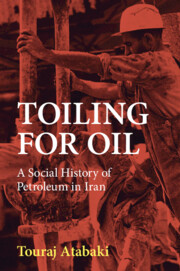Book contents
- Toiling for Oil
- Toiling for Oil
- Copyright page
- Dedication
- Contents
- Figures
- Maps
- Tables
- Note on Transliteration
- Preface and Acknowledgments
- Chronology
- Introduction
- 1 Oil Discovery and the Formation of a New Iranian Society
- 2 Oil and Labour in the First World War
- 3 Oil and Authoritarian Modernisation During Interwar Period
- 4 The Second World War: The Great Powers’ Rivalry for Oil
- 5 Poised to Leap: Towards Oil Nationalisation
- 6 Sovereignty’s Interlude: Iran’s Oil in 1951–1954
- 7 From Disparity to Planned Development: 1954–1962
- 8 Oil, Workforce, and the Developmental State: 1960s–1970s
- 9 Shop Floor Labour Activism: From the White to the Islamic Revolution
- Epilogue
- Notes
- Bibliography
- Index
2 - Oil and Labour in the First World War
Published online by Cambridge University Press: 28 November 2024
- Toiling for Oil
- Toiling for Oil
- Copyright page
- Dedication
- Contents
- Figures
- Maps
- Tables
- Note on Transliteration
- Preface and Acknowledgments
- Chronology
- Introduction
- 1 Oil Discovery and the Formation of a New Iranian Society
- 2 Oil and Labour in the First World War
- 3 Oil and Authoritarian Modernisation During Interwar Period
- 4 The Second World War: The Great Powers’ Rivalry for Oil
- 5 Poised to Leap: Towards Oil Nationalisation
- 6 Sovereignty’s Interlude: Iran’s Oil in 1951–1954
- 7 From Disparity to Planned Development: 1954–1962
- 8 Oil, Workforce, and the Developmental State: 1960s–1970s
- 9 Shop Floor Labour Activism: From the White to the Islamic Revolution
- Epilogue
- Notes
- Bibliography
- Index
Summary
On the cusp of the First World War, the global transition from coal to oil as the predominant energy source for technological, military, and industrial purposes markedly augmented the strategic value of oil, a prominence it retained for subsequent decades. In reaction, the British government, which possessed a 51 per cent stake in the Anglo-Persian Oil Company, sanctioned a significant expansion of the industry within its sphere of indirect influence. As petroleum demand escalated during the conflict, this enlargement necessitated the prioritisation of workforce allocation and maintenance, essential for producing petroleum in its varied forms. In response, a novel labour recruitment policy was instituted in collaboration with the British Indian Raj, extending the scope of recruitment beyond the borders of Iran through the Persian Gulf. As the war intensified, the strategic significance of Iran – highlighted by its extensive oil reserves and the proximity of its oil fields and refinery to the Mesopotamian front – transformed it from a marginal theatre of war into a pivotal military operations centre, thereby rendering it a sustained zone of conflict. This shift profoundly affected the operations and security of the Iranian oil industry and markedly influenced the working and living conditions of the labour force throughout the duration of the war.
Keywords
- Type
- Chapter
- Information
- Toiling for OilA Social History of Petroleum in Iran, pp. 44 - 69Publisher: Cambridge University PressPrint publication year: 2024

